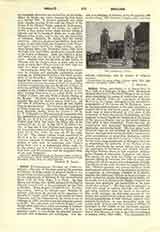

Ceillier, REMI, patrologist, b. at Bar-le-Duc, May 14, 1688; d. at Flavigny, May 26, 1763. He received his early education in the Jesuit College at Bar-le-Duc. After completing the course of humanities and rhetoric, he entered (1705) the monastery of Moyen-Moutier in the Vosges, belonging to the Benedictine congregation of St-Vannes and St-Hydulphe. Later he was appointed professor in the same monastery, a position which he held for six years. In 1716 he was made dean of Moyen-Moutier, in 1718 prior of the monastery of Saint Jacques de Neufchateau, in 1724 assistant to Dom Charles de Vassimont at the priory of Flavigny-sur-Moselle, and on the latter’s death in 1733 prior of that monastery. Under his wise administration this monastery flourished materially, spiritually, and intellectually. His first great work, prepared while he was professor at Moyen-Moutier, was an “Apologie de la morale des Peres, contre les injustes accusations du sieur Jean Barbeyrac, professeur en droit et en histoire b. Lausanne” (Paris, 1718). In this work a long dissertation of 40 pages is devoted to establishing the authority of the Fathers of the Church; afterwards the author follows step by step the arguments of Barbeyrac, and defends individually those Fathers whom he had attacked—Athenagoras, Clement of Alexandria, Augustine, and others. The success of this work led Ceillier to undertake another, similar in character, but wider in scope, and dealing with all the sacred and ecclesiastical writings. The nature of the work can best be judged from its title, “Histoire generale des auteurs sacres et ecclesiastiques qui contient leur vie, le catalogue, la critique, le jugement, la chronologie, l’analyse et le denombrement des differentes editions de leurs ouvrages; ce qu’ils renferment de plus interessant sur le dogme, sur la morale, et sur la discipline de l’Eglise; l’histoire des conciles taut generaux que particuliers et les actes choisis des martyrs”. The first volume appeared in 1729, the others at various intervals, the 23d and last being published after the death of the author. The work contains an historical account of the sacred and ecclesiastical authors, lists, analyses, and critical appreciations of their writings, together with selected quotations; it was incomplete when the author died. It ends with the writings of William of Auvergne in the middle of the thirteenth century. It has passed through several editions; the latest is that of Abbe Bauzon, 17 vols. in 4to with two volumes of indexes (Paris, 1860-1869). The preparation of a work so comprehensive in character was made possible by the assistance which Ceillier received from his confreres. The most valuable portion of the work is that dealing with the Fathers of the first six centuries. Here the author was able to draw upon the writings of Tillemont, and to use the scholarly Benedictine editions of the Fathers. Charges of Jansenism made against Ceillier in his lifetime and afterwards find no substantiation in his writings, and the treatment accorded to the author and his works by Benedict XIV shows that the pope had no doubts as to his orthodoxy.
PATRICK J. HEALY

